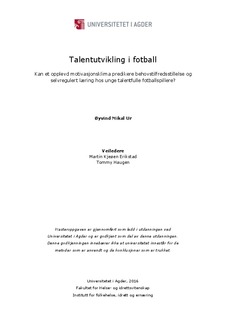| dc.contributor.author | Ur, Øyvind Mikal | |
| dc.date.accessioned | 2016-10-10T07:22:49Z | |
| dc.date.available | 2016-10-10T07:22:49Z | |
| dc.date.issued | 2016 | |
| dc.identifier.uri | http://hdl.handle.net/11250/2413744 | |
| dc.description | Masteroppgave i idrettsvitenskap - Universitetet i Agder 2016 | nb_NO |
| dc.description.abstract | Studies that have looked at the relationship between training and performance have sown that
athletes must practice at lot in order to reach a high level (Côté et al., 2007; Ericsson et al.,
1993; Simon & Chase, 1973), and motivation is viewed as an important factor in order to
implement the required training. Through satisfaction of the basic needs of autonomy,
competence and relatedness, athletes will feel self-determination and intrinsic motivation
(Deci & Ryan, 1985). Furthermore, football players who spend more time promoting their
own learning is often preferred over players taking less responsibility (Toering et al., 2012).
This study was a cross-section study with survey design, and the aim of this study was to
examine if perceived motivational climate could predict need satisfaction and self-regulated
learning in young talented football players (boys, 13 – 14 years). There were 648 respondents
from Norway who responded to the questionnaire, and all were selected football players.
Questionnaires were sent out to the respective regional football teams in Norway. It was
performed correlation and regression analysis to examine the hypotheses. The results showed
that a mastery-oriented motivational climate positively predicted basic need satisfaction and
self-regulated learning. A performance-oriented motivational climate was a negative predictor
for satisfaction, while self-regulated learning could not be predicted by this climate. Findings
highlight that a mastery oriented-motivational climate will be an important factor on
promoting the need satisfaction and self-regulated learning in young football players. The
study's results are discussed against previous theory and empirical evidence, while it comes
with a new understanding of the area.
Keywords: Talent development, mastery oriented motivational climate, performance oriented
motivational climate, basic need satisfaction, self-regulated learning | nb_NO |
| dc.language.iso | nob | nb_NO |
| dc.publisher | Universitetet i Agder ; University of Agder | nb_NO |
| dc.subject | talentutvikling | nb_NO |
| dc.subject | mestringsorientert motivasjonsklima | nb_NO |
| dc.subject | restasjonsorientert motivasjonsklima | nb_NO |
| dc.subject | behovstilfredsstillelse | nb_NO |
| dc.subject | selvregulert læring | nb_NO |
| dc.subject | talent development | nb_NO |
| dc.subject | mastery oriented motivational climate | nb_NO |
| dc.subject | performance oriented motivational climate | nb_NO |
| dc.subject | basic need satisfaction | nb_NO |
| dc.subject | self-regulated learning | nb_NO |
| dc.subject.classification | ME517 | |
| dc.title | Talentutvikling i fotball : kan et opplevd motivasjonsklima predikere behovstilfredsstillelse og selvregulert læring hos unge talentfulle fotballspillere? | nb_NO |
| dc.type | Master thesis | nb_NO |
| dc.subject.nsi | VDP::Social science: 200::Social science in sports: 330::Physical education and sport psychology: 333 | nb_NO |
| dc.source.pagenumber | [64] s. | nb_NO |
